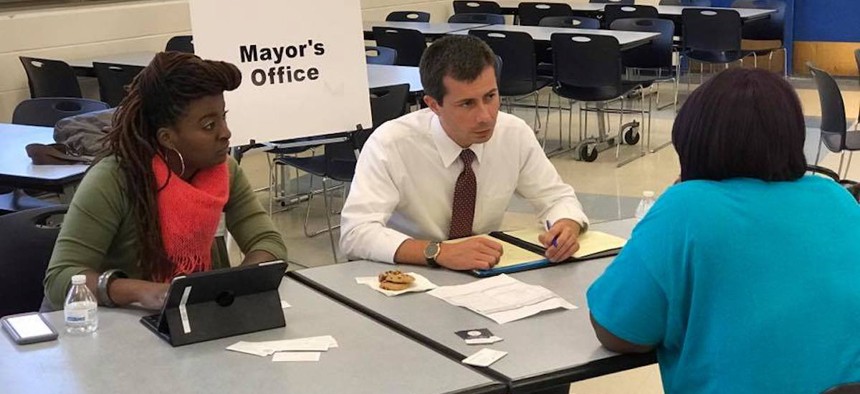The President of Everywhere, USA

South Bend Mayor Pete Buttigieg Office of Mayor Pete Buttigieg / Facebook
We asked South Bend Mayor Pete Buttigieg about a recent Politico headline, automation and much more at SXSW.
AUSTIN, Texas — South Bend Mayor Pete Buttigieg believes Washington’s political class has it backwards.
“I think the tradition for . . . political observers in Washington has been to look at state government as kind of the bush league or the junior league and then eventually you move to so-called higher office and you get to work on federal issues,” Buttigieg told Route Fifty during SXSW this week. “Right now I think the reverse is true. I think so many of the most interesting and compelling solutions are coming from outside of Washington.”
Recently, Politico magazine published a long-form piece on the rising Democratic star that carefully outlined his experience as mayor of South Bend. The headline, however, “ The President of Nowhere, USA ,” with an correspondingly desolate background of Buttigieg standing alone in the snow, may have portrayed something else.
“It may look like ‘Nowhere USA’ to a headline writer at Politico but to us it’s not only home but it’s the cutting edge and this is where we are on the ground dealing with issues that are considered national issues,” Buttigieg said when Route Fifty asked him about the headline. “From police use of force and relationships with minority communities and police to climate change, which we are on the business end of right now as a city that just experienced major flooding.”
Buttigieg said the city leaders he was convening with at SXSW’s mayor summit, Civic I/O, were required to wrestle with these issues in a way federal elected officials did not. And, from his perspective it's a dynamic that is not static.
“I think you’re going to see more and more of the action, the energy, the dynamism and the talent being found at the local level—and it’s going to be the state and national government trying to catch up,” he said.
Check out our key takeaways from the interview below.
Why he’s passionate about studying automation:
“Automation means you go through jobs or even careers far more quickly in our generation than in our parents or grandparents generation. These are deep questions that are going to change the faces of our cities and it’s almost like all the shocks that my part of the country, the industrial Midwest, it’s almost like what we went through in the 90s, except this time we see it coming, so there’s no excuse not to prepare for it.”
What he’s taking into account with smart city solutions:
“You have so many of these things that are around the corner. One of our speakers were talking about automated smart street lamps and we’re actually not that far out from that, and that has some profound implications on everything from energy efficiency and climate change to questions about surveillance. […]
There’s so many things that are changing right now or would be foolish not to think they are going to change. We don’t have to predict all that future but we do need to make sure we’re designing our cities in a way that’s robust and resilient for the changes to come.”
The exchange of ideas with other mayors:
“By definition, when you’re a mayor you’re the only one in your city at any given moment. And so being able to come to a community of mayors is really important. You compare notes, you find out where you’re ahead and where you’re behind, you get a sense of solidarity. We’re also people, so it’s not just a professional relationship you also just make friends with people who are doing the same kind of things that you do, and there’s a great kind of social network and social culture developing, which I think is going to become more and more important given that our national and state politics are so challenged, to have that national—even global community of mayors coming together to solve problems and help each other through these challenges."
How to create a healthy city when health is not part of your job description:
"How you do bikeability, where you put a road, where a trail goes, how you set up your parks and what kind of streetlights you have. Those are my decisions, but if I think about the way it might affect the way people walk or run, or don’t, in our city—it turns out those are public health decisions, too, and I owe it to the community to have that public health hat on, even if I don’t have a public health department to my name as part of the city administration."
ALSO from Route Fifty ’s coverage from SXSW 2018:
Mitch Herckis is Senior Director of Programs for Government Executive’s Route Fifty and is based in Washington, D.C.
NEXT STORY: A New Way Drone Hobbyists Are Endangering First Responders






